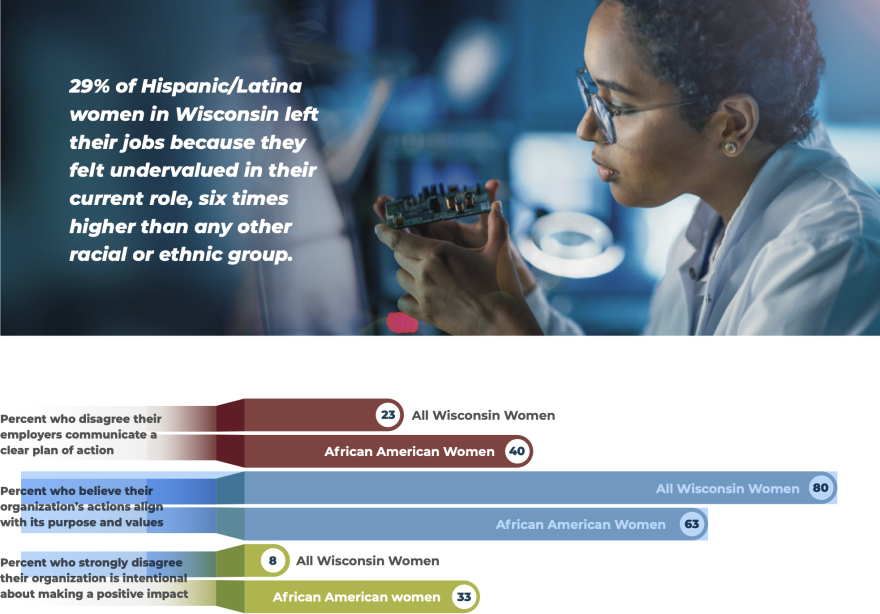New research reveals that half of working women in Wisconsin are considering leaving their current jobs since the pandemic began — 25% higher than the national average. The number is even higher for women working in retail, food service and hospitality industries.
This study by Kane Communications Group is the first of its kind to look into women’s outlook regarding their jobs, stress levels, state of well-being, support and satisfaction. The report also makes recommendations for employers on how to make workplaces better for women.
"We wanted to get a pulse check on how working women in the state of Wisconsin were feeling, and we wanted to get a sense of what does a modern day work environment used to look like to keep women engaged and to retain women in the workforce," says Kimberly Kane, president and CEO of Kane Communications.

Kane notes that these large numbers of women reconsidering their current job has a lot to do with the pandemic's impact on women in the workforce.
"The pandemic redefined our relationship with our employers. So many women were working from home and were working hybrid schedules. In addition to often very high expectations from their employer, sometimes no flexibility from their employers, they also became full time stay at home moms and full time teachers," says Kane.
Other reasons that women are leaving the workforce include having large amounts of stress and not having access to childcare. Eighty-one percentage of women in the study said they their work didn't include childcare.
Still, the biggest reason women want to leave their jobs, Kane says, is because overall they feel undervalued.
"Unfortunately, in too many cases, their employers were not meeting [women] where they're at, were not listening to how they were feeling, and we found that while 50% of women are considering quitting, they haven't left the workplace entirely. So women are leaving their jobs, but they may be going to work for other employers that help them feel valued. So employers have a chance to meet women where they're at ... and that's gonna be key moving forward for Wisconsin employers."
Jen Dirks is the president and CEO of Tempo Milwaukee, a group of nearly 800 executive and emerging women leaders. She adds that many women have confided in Tempo Milwaukee that their workplace is not understanding that they may be juggling a lot since the pandemic has started.
"It's just completely changed and I think employers run a risk if they are not addressing these issues, and not seeing what is happening inside their doors. If they don't do anything about it, it's going to be unaddressed," says Dirks.
Women of color face additional barriers when in the workplace. Forty-two percent of African American women said they felt undervalued in the workplace, while 29% of Latinas said they quit because they felt undervalued.

"Those numbers are disturbing on a number of different levels. Again, it's a call to action that I think Wisconsin employers can't just create a program and check a box, you know, put pictures and words on their website. They really have to evaluate what an inclusive work environment actually is," says Kane.
According to the study, there's two industries that have the most work to do in terms of improving working conditions for women: manufacturing, transportation, energy and agriculture (MTEA) and the hospitality industry.
Kane and Dirks both say they hope that this study will be eye-opening and employers will finally take a deep look inside what they are doing to attract and retain women.
"I hope that employers download this report, I hope they look at the statistics, and I hope they work with their leadership teams to you know, have a few 'Aha moments' within their own organizations, and then plan to make retaining working women a priority in 2022," says Kane.







